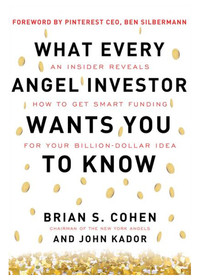If you're thinking of starting a company, chances are you're going to find yourself pitching angel investors. And while all angels aren't the same, they share some characteristics and motivations that allow you to think of them as a class of investor. Understanding how they think, what gets them excited, and what scares them away can be the difference between getting your company funded and ending up without the capital to build your business.
Brian Cohen is a classic entrepreneur who made it big, and now has turned his attention to being a passionate advocate for the startups he's funded and the angel community at large. While most investors like to keep the secrets of their deal making and the inner workings of their deal DNA a secret, Cohen's just not a secretive kind of guy. He wants to see great companies win, and great founders reach their personal best. Cohen embodies the word angel.

He's opened his biography, his bag of tricks, and his vision for entrepreneurs in a new book, What Every Angel Investor Wants You to Know. It starts when he was in college and his first mentor, a professor at Boston University, Harold "Bucky" Buchbinder, called him into his office and said: "Never, ever work for anybody. It's the closest thing to slavery." Cohen took the advice to heart, and wants to make sure he saves as many young people from "slavery" as he can.
Had I met him earlier in my career, he would have saved me too. But by the time I met him, I was already fully engaged in a life as a startup entrepreneur. I'd started four companies, but none of them with angel money. Like most tech startups at the time, I traveled west to Sand Hill Road in Silicon Valley and had a pretty rough few days with VCs who didn't much fancy having to bet on a company with a 212 phone number. I came back to New York a bit bruised, and through some networking that I'd later learn fits right in with Cohen's advice, I presented to New York Angels. All the things that had fallen flat out west rang true in the room with Cohen and his peers. My passion, my history in the video world, my clear focus on what was wrong with web video, and my drive to be leading the world into a new way to organize and monetize video. Among Cohen and his peers, including David S. Rose, who was then the Chairman of New York Angels, I had a smart and receptive audience. In fact, both of them ended up investing in my company, Magnify.net.
I'm pleased to report that many of the things I got right by intuition or good fortune are now happily shared in the pages of Cohen's book pages.
Among the powerful truths that Cohen shares, one is that while VCs are investing money that has been trusted to them by their Limited Partners (LPs), angel investors are betting their own capital. That changes how they look at investments, and how they feel about the companies they do end up funding.
Here's how Cohen explains it: "I've asked hundreds of angels why they invest. Many invest for the financial return. Some do it for fun or to keep themselves engaged. Some are angels because they sincerely want to help entrepreneurs, although they are not necessarily good at it."
Angels look for founders with a drive and entrepenreueral sprit, even if sometimes it can be a bit much. "It's about creating relationships that serve as a force multiplier for the best that human intelligence can create. Entrepreneurial spirit builds wealth through resources that only the best relationships inspire. When it's done right, entrepreneurial spirit is about connecting dots that aren't yet visible. It's about having the intuition--the faith, if you will--to overcome every obstacle to cultivate innovation and initiative."
Cohen describes angel investing as a "contact sport," which is spot on. But he doesn't mean a conflict or a fight, he means an engagement. "Founders have a tendency to think that all money is the same. That's not true. You see, it's not the money that's really doing the heavy lifting for your startup; it's your choice of the smart angels who are investing in you, not just your company."
And Cohen should know. As one of the first backers of Pinterest, he's able to say with certainty that he can pick winners. I should confess here that Cohen introduced me to Pinterest founder Ben Silbermann in those early pre-money days, as Pinterest was to be a curation platform, a space I theoretically know a good deal about. I didn't invest, despite Cohen's urging. OK, so I'm not so smart. But he is.
The book is chock full of real world advice, honest self appraisals, and good chewy information that I wish I had when I went out to raise money.
The four critical attributes that startups need to raise venture capital, Cohen says, are capacity for growth, scalability, profitability, and sustainability. In my experience these are more the measures of East Coast angels. Silicon Valley folks may be looking at different metrics. But as New York grows its startup DNA, that may be changing out west as well.
Perhaps the most startling admission in the book, and in some ways the most dramatic difference between VC and angel investors, is the outcomes. Here Cohen is starkly realistic. "Do angel investors make money? The short answer, for the great majority of angels, is no. Even the smartest angels I know feel lucky if they are net-zero after a few years" says Cohen. Which isn't to say they don't want to make money; they do. But angels are in it for other reasons as well: they've done well, have some money they can risk, and want to work with exciting startups and entrepreneurs. So they're willing to wade into the risky end of the pool and bet on long shots with big ideas and the potential for big wins in the end. Cohen warns against taking convention VC money in a seed round and makes an argument for why this can complicate things down the road.
But the book really heats up when Cohen and his co-author let you inside the heads of angels. The book really helps you understand what makes angels tick, why they want to get so close to both you and your business, and how you can be ready to ask and answer questions that are going to build relationships and move you closer to closing a deal. Cohen says the best question he has ever been asked by a founder was "What excites you about my business?"
"I love that," Cohen says. "It's both positive and incisive. It move things forward and gets you closer to 'yes' or 'no'-- but either answer is better than maybe."
As any hungry entrepreneur chews through the book, you'll find the second half full of real world data and actual hands-on information related to term sheets, due diligence, and exits.
For me, these pages were like gold. Rather than broad sweeping generalizations, they where specific and detailed access inside the process. For some just getting started it may be a bit daunting. Tough luck.This is what it takes to raise money, run a process, and close deals. If it's too much for you, better to learn that now rather than hope that checks will magically fall out of the sky. Deals require diligence on both sides, and Cohen does the market a great service by sharing the mechanics of how deals get done.
Angel investing is deeply personal. It's both a job and a calling. Angels take what they do seriously; they're betting with their own chips. And often, they're looking to give back in ways that are both personally fulfilling and economically beneficial. Sure, lots of startups fail, but angels want to bet on committed, hard working, visionary entrepreneurs who are going to swing for the fences. To borrow Steve Jobs's famous line, angels want to bet on individuals who are out to "put a dent in the universe."
